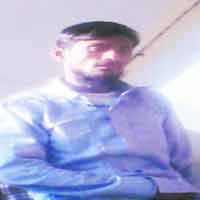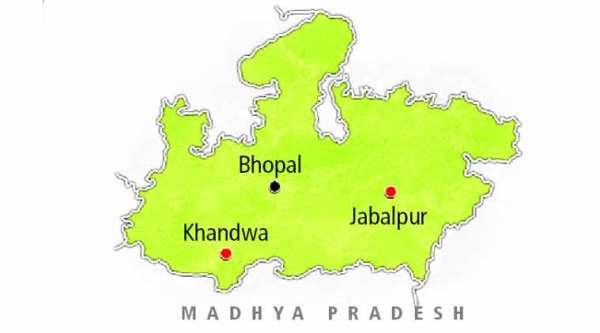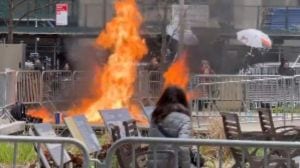- India
- International
Faisal’s 5: Story of men who fled Khandwa jail, named in terror attacks and bank robberies
In a little over a year, members of the Abu Faisal gang who fled Khandwa jail in MP have been named in terror attacks and bank robberies across the country.
 (Clockwise from top): Aizazuddin, Amjad, Aslam Ayub, Abu Faisal, Zakir hussain and Mehboob alias Guddu
(Clockwise from top): Aizazuddin, Amjad, Aslam Ayub, Abu Faisal, Zakir hussain and Mehboob alias Guddu
His son has been accused of inciting communal tension, being a member of the banned SIMI, carrying out terror attacks and robbing banks. Police of at least five states and Central agencies have been looking for him ever since he pulled off a daring escape from a jail not too far from where he spent his childhood.
Father Ismail Khan still lives in that thatched-roof hut at the end of a narrow lane crawling with pigs. Till a few years ago, the 68-year-old used to sell fruits from a cart for a living. Now he begs. Ismail shares the hut with his ailing father. His wife Nagma went missing a few weeks ago. The authorities suspect it was to be with their son Mehboob alias Guddu in Maharashtra, after he was injured while allegedly building a bomb in Bijnore, Uttar Pradesh.
That’s just one of the stops in a crime trail the authorities say started from Khandwa in Madhya Pradesh and extends to Telangana, Uttar Pradesh, West Bengal and Tamil Nadu. As part of the ‘Abu Faisal gang’, 28-year-old Mehboob and four others are accused of, among other things, a February 1, 2014, bank robbery in Karimnagar, Telangana; the May 1, 2014, blast on a Bangalore-Guwahati train at the Chennai Central Station that killed a young software engineer; and the July 10, 2014, blast in the parking lot of Faraskhana and Vishrambag police stations in Pune. Their names, CCTV images and phone numbers have popped up in probes. In the latest instance, police are investigating if money the men allegedly stole from a Karimnagar bank turned up in the Burdwan blast in West Bengal.
The five were jailed in the first place in June 2011 on charges of murdering policemen, attempts to murder, bank robberies and for inciting communal tension while working for SIMI.
On October 1, 2013, the five, along with Faisal and another prisoner, made an audacious escape from the district jail in Khandwa after scaling a 14-ft wall. Till hours after the escape, the authorities remained clueless about it. While the seventh prisoner surrendered the next day and Faisal was caught in December from Barwani in Madhya Pradesh, the rapsheet against the remaining five — Mehboob, Aslam Khan, Amjad Khan, Zakir Hussain alias Sadiq, and Aizazuddin alias Rahul —has kept growing. In the past few weeks, investigators have more than once come close to capturing them, only to miss them narrowly.

***
In the beginning, there was a constable, specifically ATS constable Sitaram Yadav. He came to Khandwa, a communally sensitive town 130 km from Indore, around 2000 and eight years later, joined the Anti-Terrorism Squad. In Khandwa, he took a house on rent in Ganesh Talai. In 2005-06, at a time when Khandwa was seeing a spurt in communal clashes, Yadav acquired a reputation for routinely picking up Muslim youths, who would be released later.
 Aslam Ayub
Aslam Ayub
One of those he arrested was Abu Faisal’s wife, who belongs to Khandwa. Along with her sister, she was charged with keeping inflammatory material. Their brother Inam-ur-Rehman would in 2009 be arrested by the ATS for the 2008 serial blasts in Jaipur. Three years later, Inam-ur-Rehman was among those acquitted. Incidentally, the same “inflammatory material” seized from sisters Aasiya and Rafia later turned up in many cases against SIMI activists across the country.
Faisal, who belonged to Mumbai but was studying homeopathy in Indore, bore a grudge against Yadav for this, says advocate Javed Chouhan. The advocate himself was held once and represents arrested SIMI members, including his own brother. A former Khandwa SP says Faisal would regularly visit Khandwa because of his wife, and knew about the constable’s reputation.
On November 29, 2009, Yadav was killed at Khandwa’s Tin Pulia. Police blamed SIMI activists. Former Khandwa SP Manoj Sharma refuses to talk about the case except saying constable Yadav was “daring”.
Yadav’s wife Jyoti calls him a hero. “He was never scared of anyone,” she says, adding that the men who killed her husband should be hanged. Yadav is survived by Jyoti and their children, sons 11 and 10.
***
Ganesh Talai is where Mehboob, Aslam, Amjad and Zakir too lived, all in the vicinity of a mosque. They came from poor families, and had to leave studies mid-way to supplement the family income.
All Ismail ever hoped for was for Mehboob to pick up some “hunar (skill)”. “After Class VIII, he learned tailoring for two years and earned Rs 600-800 a day.”
Mehboob was among those routinely targeted by police, says Ismail. “Every time there was an incident of stone-pelting, they took him in custody.
 Mehboob Alias Guddu
Mehboob Alias Guddu
Frustrated, he left for Amravati (in Maharashtra) and lived there for four years.” Sometime in 2005, he joined SIMI, then already banned.
In 2011, Mehboob was named in the murder of Sitaram Yadav. On June 3, 2011, another ATS constable, Shivpratap Singh, was killed in an encounter near the Ratlam railway station, apparently in a bid to arrest one of those accused in Yadav’s murder. Police then cracked down.
Nineteen youths were held in quick succession, one on June 3, eight on June 5 and 10 on June 14, including Faisal. The eight held on June 5 and Zakir who was arrested on June 3 were named members of the Indian Mujahideen and SIMI. Police claimed all nine were unhappy with the September 2010 Allahabad High Court judgment in the Babri Masjid case and were planning to attack judges.
Police also named Mehboob in the Ahmedabad serial blasts of 2008. The NIA says he was among the SIMI men who attended a camp in Wagamon in Ernakulam, Kerala, in December 2007.
“Mehboob was booked in so many cases that we did not even think of engaging a lawyer for bail. I don’t have the money,” says Ismail Khan. Of his five other children, from two wives, only Mehboob and an elder daughter survive.
Ismail is evasive about where Mehboob’s mother Nagma is now. He claims she walked out one night after a fight. After some time, he amends, “Two tall, unidentified men came around 11 pm and she left with them. They could be policemen, they could be anybody.”
It were Mehboob’s injuries that helped police trace the five absconding to Bijnore. On September 12, a low-intensity blast occurred at a rented accommodation in the Uttar Pradesh town, following which three people who lived in the house went missing. They later brought Mehboob, who had suffered burns, to a doctor’s clinic, where their faces were captured on CCTV. Three others, suspected to be their associates and living nearby, are also missing.
Ismail wonders how the charges fit in with what he remembers of the son who avoided quarrels and “wouldn’t hurt a fly”. “Though Mehboob was in demand for his tailoring skills, he would not stitch more than three-four salwar-kameezes a day to ensure he had time for namaz and the Quran,” Ismail says.
He adds that he has had no contact with Mehboob since he fled prison.
***
 Zakir Hussain
Zakir Hussain
Zakir had studied up to Class X, learnt a bit of masonry and was starting to get small contracting jobs when police came knocking. His father Badrul, a sand trader, says his son is where he is now because of his repeated brushes with the police. The first time Zakir was arrested was in 2008, when he was 24, for allegedly procuring a fake SIM card and for being a member of SIMI.
When constable Yadav was murdered, Zakir was among those named. He was eventually arrested in 2011 along with the eight others after constable Singh’s death in Ratlam.
His mother says Zakir shifted to Ratlam as he feared for his life in Khandwa. He was attacked once and police refused to register a case, she says.
Within days of Zakir’s arrest, his younger brother Altaf was also arrested. Altaf wasn’t among the seven who fled in October 2013 from Khandwa jail and continues to be lodged there.
Slamming the local media, Badrul says they wrote stories such as that the family “owned 11 properties”. “We own only two small plots, including one bought from money received by my sister,” he says.
A father of six, the 54-year-old says he has come to terms with the fate of both his sons. “As a child I used to pray in temples. Now even Muslims try to maintain distance from us.”
Badrul says he last talked to Zakir before he escaped from prison.
***
 AMJAD
AMJAD
Amjad, 25, was among the nine “SIMI activists” held in June 2011. Police then named him for a robbery at a gold finance company in Bhopal in 2010.
His mother, speaking from behind a curtain at their two-room house built on encroached government land, says they didn’t send Amjad to school after Class VIII as they couldn’t afford the fees. Amjad’s parents have five other children. So Amjad first worked as a porter and later as a driver, earning Rs 4,000 a month.
She alleges that the police caught her son from Nandurbar in Maharashtra but the arrest was shown from Jabalpur. “Had he robbed gold, wouldn’t we be better off?” she asks. Amjad’s father Ramjan claims he first heard about SIMI after he was arrested.
After his initial arrest, Amjad was released on bail but later booked for the Ratlam shootout. “They held me at the police station and said that I would be released only if Amjad turned himself in,” Ramjan says of his son’s re-arrest.
Amjad too was a devout Muslim, offering namaz five times a day.
They met last in Khandwa jail, says Ramjan, who is in his late 40s.
***
 Aslam Ayub
Aslam Ayub
Aslam, 24, too only studied till Class VIII and worked as a mason till his arrest in June 2011 along with the eight other “SIMI men”. His father Ayub worked as a labourer and later as a driver to take care of his family of six. The family continues to live in Ganesh Talai in a two-room house.
Aslam’s brother Ashfaq was also arrested by the police. Out on bail, he refuses to talk about his arrest or the charges.
Mother Shahroz Bi says police started targeting Muslim youths calling them SIMI members after communal riots eight-nine years ago. Aslam has reportedly told police he began working for SIMI in 2005.
Shahroz says she got to know of Aslam’s arrest two months after he was held. “I have met him four times in jail. Who will disown own child?” she says.
The last time she saw him was just a few weeks before he escaped, says Shahroz.
***
The only one of the five wanted SIMI men not from Khandwa, Aizazuddin alias Riyaz alias John alias Raja alias Rahul, grew up in a Muslim-dominated locality in Kareli, 100 km from Jabalpur. His father Mohammed Azizuddin has nine children.
A senior police officer in Kareli says Aizazuddin was the brightest among his eight siblings. The first-year Arts student probably came in contact with SIMI members in Jabalpur. Kareli and Jabalpur are connected by rail.
Aizazuddin did not figure in any police records before his arrest in June 2011 while one of his brothers was involved in a relatively minor crime.
Most of his siblings and parents have reportedly left Kareli and settled somewhere in Bhopal, according to the police.
In September this year, Faisal and Aizazuddin were among SIMI activists acquitted of a bank robbery bid by a court in Bhopal. The SIMI activists were accused of attempting to rob a Punjab National Bank branch in Jaora, Ratlam district, on April 27, 2010. The complaint had been lodged nearly 20 months later, in December 2011.
***
Some other robbery cases lodged against the SIMI men also stand on wobbly ground now. In the Bhopal Mannapuram Gold Finance case of 2010, in which 12 kg gold and Rs 3 lakh were stolen, the police had earlier arrested some other accused. But after the June 2011 arrests of SIMI members, it said six of its activists had confessed to it. Police also claimed to have recovered some of the gold from a house in Tatanagar, Jamshedpur.
Last month too, the state police alleged SIMI involvement in a bank robbery in Satna. An ATS official confessed that so far they had found no proof.
Bhopal-based advocate Parvez Alam, who represents most SIMI accused, alleges that the state and Central agencies blame the organisation for so many offences because they want the ban on SIMI to remain in force.
The Hindu neighbours of the four SIMI accused in Khandwa’s Ganesh Talai choose not to talk much about the arrests but accuse them of starting communal incidents. “They hardly interacted with the others. They would keep a very low profile while in Ganesh Talai. We came to know of the SIMI connection only after reading news reports about their arrest,” says Santosh Gyani, a BJP activist.
The town also talks about how after one such communal skirmish around six years ago, both the communities had patched up and withdrawn cases. This ensured peace for some time.
Till, that is, the constable was killed.
‘The Sardar’
BY: AAMIR KHAN
Linked to both the Indian Mujahideen as well as SIMI, Abu Faisal alias “doctor” is known as the “sardar of his gang”.
His father Imran Khan runs a small medical shop in a bylane in Andheri, Mumbai, lined with shops selling meat. “Our medical shop used to be elsewhere. In 1992, when communal violence was at its peak, the shop was torched down. The incident left a deep imprint on Faisal’s mind,” says Imran, claiming that even an FIR was registered only after he had paid Rs 500.
Faisal, always a good student, got admission in a homeopathic medicine college in Indore. Imran claims that’s when Faisal changed. “Though he was not part of any suspect group, he was arrested and tortured. People started calling him a terrorist,” Imran says.
While Faisal still managed to give his semester exams, he reportedly could not write the practicals as he was often taken away for questioning. Once the ATS came looking for him and they had to shut shop for 10 days, says Imran.
In a July 2013 chargesheet, the NIA accused Faisal of having participated in a training camp at Wagamaon in Kerala in December 2007, where SIMI members from all over the country participated. Soon after that, Faisal was arrested for the first time.
The Abu Faisal gang is known to have used robberies in the past to finance terrorist activities through links with SIMI and Indian Mujahideen leaders like Haidar Ali alias Abdullah, the main accused in the October 2013 attack on a Narendra Modi rally in Patna. The gang supplied stolen gold ornaments from 2010-11 to Haidar Ali, says an NIA chargesheet on the Ranchi module of the IM. Ali allegedly also sheltered Faisal in Ranchi in October 2013 after he had escaped from Khandwa jail.
Imran says he has no hope of ever seeing his son back home again. “Ab to kaafi saalon se baat bhi nahin hui (Now, it’s been years since we even talked).”
THE CASES
FEB 1, 2014: Four armed men robbed Rs 46 lakh from an SBI branch at Chopaddandi village in Karimnagar, now Telangana, and fled on motorcycles. Based on CCTV footage, police have concluded at least three of the four were SIMI men who escaped from Khandwa jail. Police are now probing if some of that money made its way to Burdwan, where a bomb killed two persons on October 2, and whether SIMI was helping set up a base there.
MAY 1, 2014: One of the missing Abu Faisal gang members was allegedly present at Jolarpet railway station in Vellore, Tamil Nadu, from where the Bangalore-Guwahati Express passed hours before a blast on it at Chennai central station. A software engineer died in the blast. Investigators say the three SIMI men involved in the attack rented a house in Dharwad between December 2013 and March 2014. They later moved to Hospet in Bellary, and were reportedly there till sometime in September.
JULY 10, 2014: A low-intensity blast went off in the parking lot of Faraskhana and Vishrambag police stations (operating from the same premises), located a few feet from Pune’s Dadgusheth temple, leaving five injured. An IED was planted on a stolen motorcycle. Mobile phone trail now allegedly links this blast to the Abu Faisal gang.
September 12, 2014: A low-intensity blast went off in Bijnore at a house from which police later recovered a pistol of 32 bore, a knife, a laptop, a gas cylinder, a large quantity of match boxes and about 10 kg matchsticks. Police said the men were trying to assemble bombs from the matchsticks’ explosives when there was a blast. Abu Faisal gang members were allegedly caught on CCTV footage after they took a colleague injured in the blast to a clinic.
Investigators say they had taken a house on rent and were living in the town since June. A phone found in Bijnore has reportedly helped police join the dots with other cases.
Apr 19: Latest News
- 01
- 02
- 03
- 04
- 05








































